
Previous in Relation and Functions Next in Relation and Functions
Question Number 77897 by mathmax by abdo last updated on 11/Jan/20
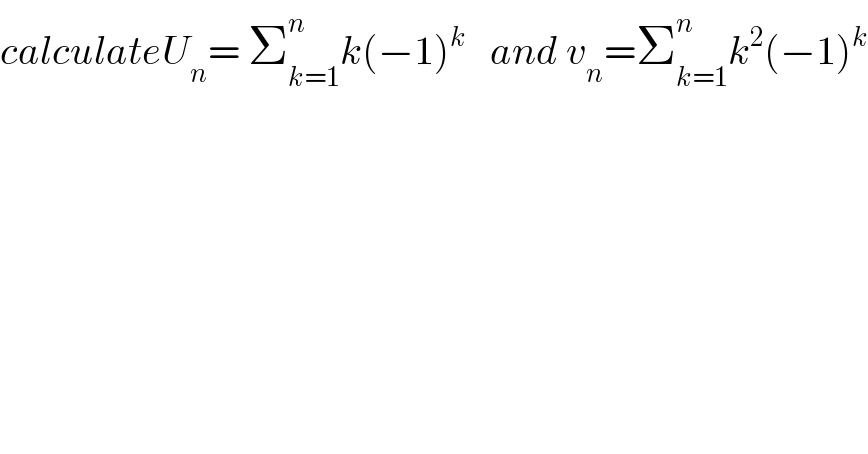
$${calculateU}_{{n}} =\:\sum_{{k}=\mathrm{1}} ^{{n}} {k}\left(−\mathrm{1}\right)^{{k}} \:\:\:{and}\:{v}_{{n}} =\sum_{{k}=\mathrm{1}} ^{{n}} {k}^{\mathrm{2}} \left(−\mathrm{1}\right)^{{k}} \\ $$
Commented by abdomathmax last updated on 12/Jan/20
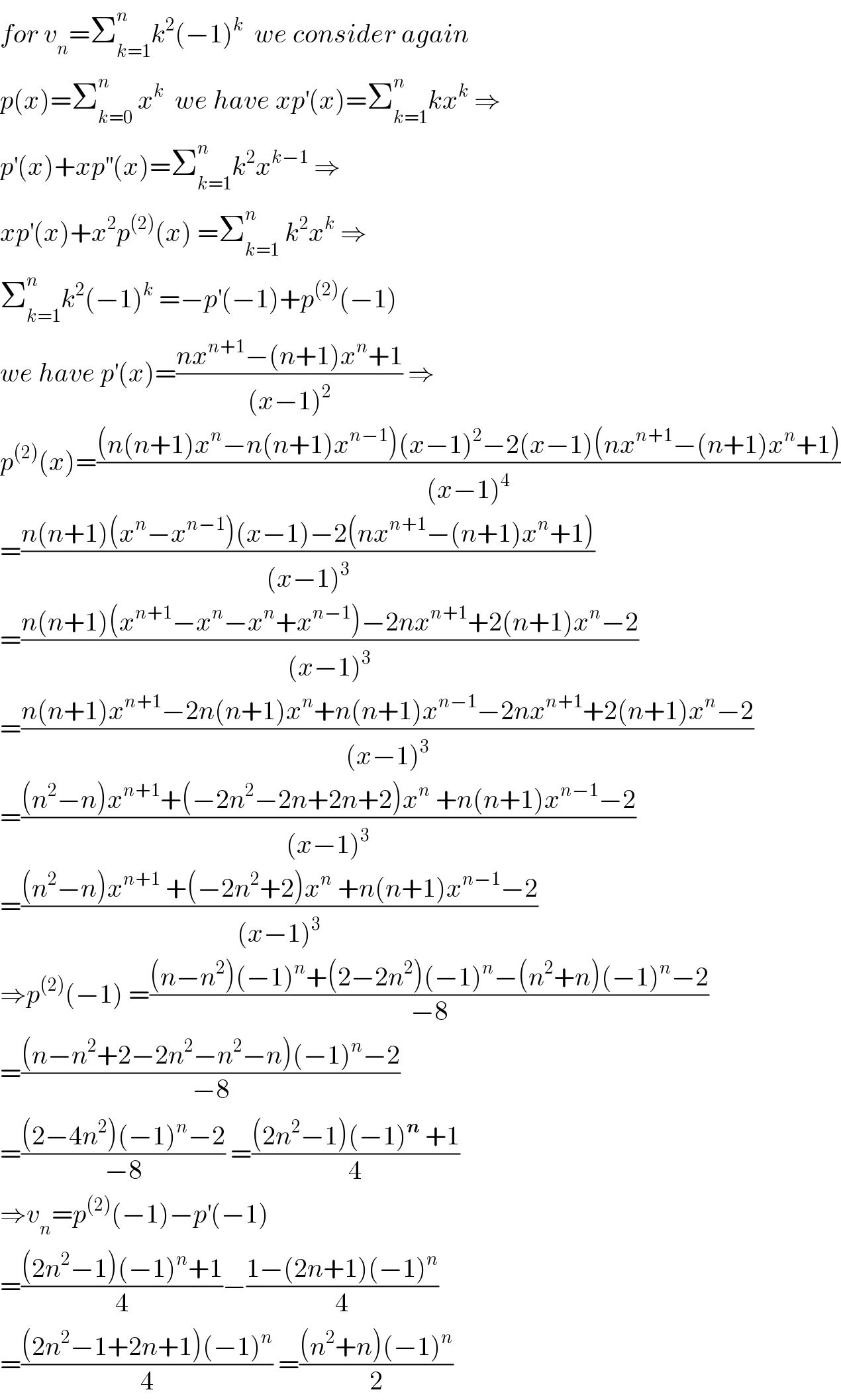
$${for}\:{v}_{{n}} =\sum_{{k}=\mathrm{1}} ^{{n}} {k}^{\mathrm{2}} \left(−\mathrm{1}\right)^{{k}} \:\:{we}\:{consider}\:{again} \\ $$$${p}\left({x}\right)=\sum_{{k}=\mathrm{0}} ^{{n}} \:{x}^{{k}} \:\:{we}\:{have}\:{xp}^{'} \left({x}\right)=\sum_{{k}=\mathrm{1}} ^{{n}} {kx}^{{k}} \:\Rightarrow \\ $$$${p}^{'} \left({x}\right)+{xp}^{''} \left({x}\right)=\sum_{{k}=\mathrm{1}} ^{{n}} {k}^{\mathrm{2}} {x}^{{k}−\mathrm{1}} \:\Rightarrow \\ $$$${xp}^{'} \left({x}\right)+{x}^{\mathrm{2}} {p}^{\left(\mathrm{2}\right)} \left({x}\right)\:=\sum_{{k}=\mathrm{1}} ^{{n}} \:{k}^{\mathrm{2}} {x}^{{k}} \:\Rightarrow \\ $$$$\sum_{{k}=\mathrm{1}} ^{{n}} {k}^{\mathrm{2}} \left(−\mathrm{1}\right)^{{k}} \:=−{p}^{'} \left(−\mathrm{1}\right)+{p}^{\left(\mathrm{2}\right)} \left(−\mathrm{1}\right) \\ $$$${we}\:{have}\:{p}^{'} \left({x}\right)=\frac{{nx}^{{n}+\mathrm{1}} −\left({n}+\mathrm{1}\right){x}^{{n}} +\mathrm{1}}{\left({x}−\mathrm{1}\right)^{\mathrm{2}} }\:\Rightarrow \\ $$$${p}^{\left(\mathrm{2}\right)} \left({x}\right)=\frac{\left({n}\left({n}+\mathrm{1}\right){x}^{{n}} −{n}\left({n}+\mathrm{1}\right){x}^{{n}−\mathrm{1}} \right)\left({x}−\mathrm{1}\right)^{\mathrm{2}} −\mathrm{2}\left({x}−\mathrm{1}\right)\left({nx}^{{n}+\mathrm{1}} −\left({n}+\mathrm{1}\right){x}^{{n}} +\mathrm{1}\right)}{\left({x}−\mathrm{1}\right)^{\mathrm{4}} } \\ $$$$=\frac{{n}\left({n}+\mathrm{1}\right)\left({x}^{{n}} −{x}^{{n}−\mathrm{1}} \right)\left({x}−\mathrm{1}\right)−\mathrm{2}\left({nx}^{{n}+\mathrm{1}} −\left({n}+\mathrm{1}\right){x}^{{n}} +\mathrm{1}\right)}{\left({x}−\mathrm{1}\right)^{\mathrm{3}} } \\ $$$$=\frac{{n}\left({n}+\mathrm{1}\right)\left({x}^{{n}+\mathrm{1}} −{x}^{{n}} −{x}^{{n}} +{x}^{{n}−\mathrm{1}} \right)−\mathrm{2}{nx}^{{n}+\mathrm{1}} +\mathrm{2}\left({n}+\mathrm{1}\right){x}^{{n}} −\mathrm{2}}{\left({x}−\mathrm{1}\right)^{\mathrm{3}} } \\ $$$$=\frac{{n}\left({n}+\mathrm{1}\right){x}^{{n}+\mathrm{1}} −\mathrm{2}{n}\left({n}+\mathrm{1}\right){x}^{{n}} +{n}\left({n}+\mathrm{1}\right){x}^{{n}−\mathrm{1}} −\mathrm{2}{nx}^{{n}+\mathrm{1}} +\mathrm{2}\left({n}+\mathrm{1}\right){x}^{{n}} −\mathrm{2}}{\left({x}−\mathrm{1}\right)^{\mathrm{3}} } \\ $$$$=\frac{\left({n}^{\mathrm{2}} −{n}\right){x}^{{n}+\mathrm{1}} +\left(−\mathrm{2}{n}^{\mathrm{2}} −\mathrm{2}{n}+\mathrm{2}{n}+\mathrm{2}\right){x}^{{n}} \:+{n}\left({n}+\mathrm{1}\right){x}^{{n}−\mathrm{1}} −\mathrm{2}}{\left({x}−\mathrm{1}\right)^{\mathrm{3}} } \\ $$$$=\frac{\left({n}^{\mathrm{2}} −{n}\right){x}^{{n}+\mathrm{1}} \:+\left(−\mathrm{2}{n}^{\mathrm{2}} +\mathrm{2}\right){x}^{{n}} \:+{n}\left({n}+\mathrm{1}\right){x}^{{n}−\mathrm{1}} −\mathrm{2}}{\left({x}−\mathrm{1}\right)^{\mathrm{3}} } \\ $$$$\Rightarrow{p}^{\left(\mathrm{2}\right)} \left(−\mathrm{1}\right)\:=\frac{\left({n}−{n}^{\mathrm{2}} \right)\left(−\mathrm{1}\right)^{{n}} +\left(\mathrm{2}−\mathrm{2}{n}^{\mathrm{2}} \right)\left(−\mathrm{1}\right)^{{n}} −\left({n}^{\mathrm{2}} +{n}\right)\left(−\mathrm{1}\right)^{{n}} −\mathrm{2}}{−\mathrm{8}} \\ $$$$=\frac{\left({n}−{n}^{\mathrm{2}} +\mathrm{2}−\mathrm{2}{n}^{\mathrm{2}} −{n}^{\mathrm{2}} −{n}\right)\left(−\mathrm{1}\right)^{{n}} −\mathrm{2}}{−\mathrm{8}} \\ $$$$=\frac{\left(\mathrm{2}−\mathrm{4}{n}^{\mathrm{2}} \right)\left(−\mathrm{1}\right)^{{n}} −\mathrm{2}}{−\mathrm{8}}\:=\frac{\left(\mathrm{2}{n}^{\mathrm{2}} −\mathrm{1}\right)\left(−\mathrm{1}\right)^{\boldsymbol{{n}}} \:+\mathrm{1}}{\mathrm{4}} \\ $$$$\Rightarrow{v}_{{n}} ={p}^{\left(\mathrm{2}\right)} \left(−\mathrm{1}\right)−{p}^{'} \left(−\mathrm{1}\right) \\ $$$$=\frac{\left(\mathrm{2}{n}^{\mathrm{2}} −\mathrm{1}\right)\left(−\mathrm{1}\right)^{{n}} +\mathrm{1}}{\mathrm{4}}−\frac{\mathrm{1}−\left(\mathrm{2}{n}+\mathrm{1}\right)\left(−\mathrm{1}\right)^{{n}} }{\mathrm{4}} \\ $$$$=\frac{\left(\mathrm{2}{n}^{\mathrm{2}} −\mathrm{1}+\mathrm{2}{n}+\mathrm{1}\right)\left(−\mathrm{1}\right)^{{n}} }{\mathrm{4}}\:=\frac{\left({n}^{\mathrm{2}} +{n}\right)\left(−\mathrm{1}\right)^{{n}} }{\mathrm{2}} \\ $$
Commented by abdomathmax last updated on 12/Jan/20
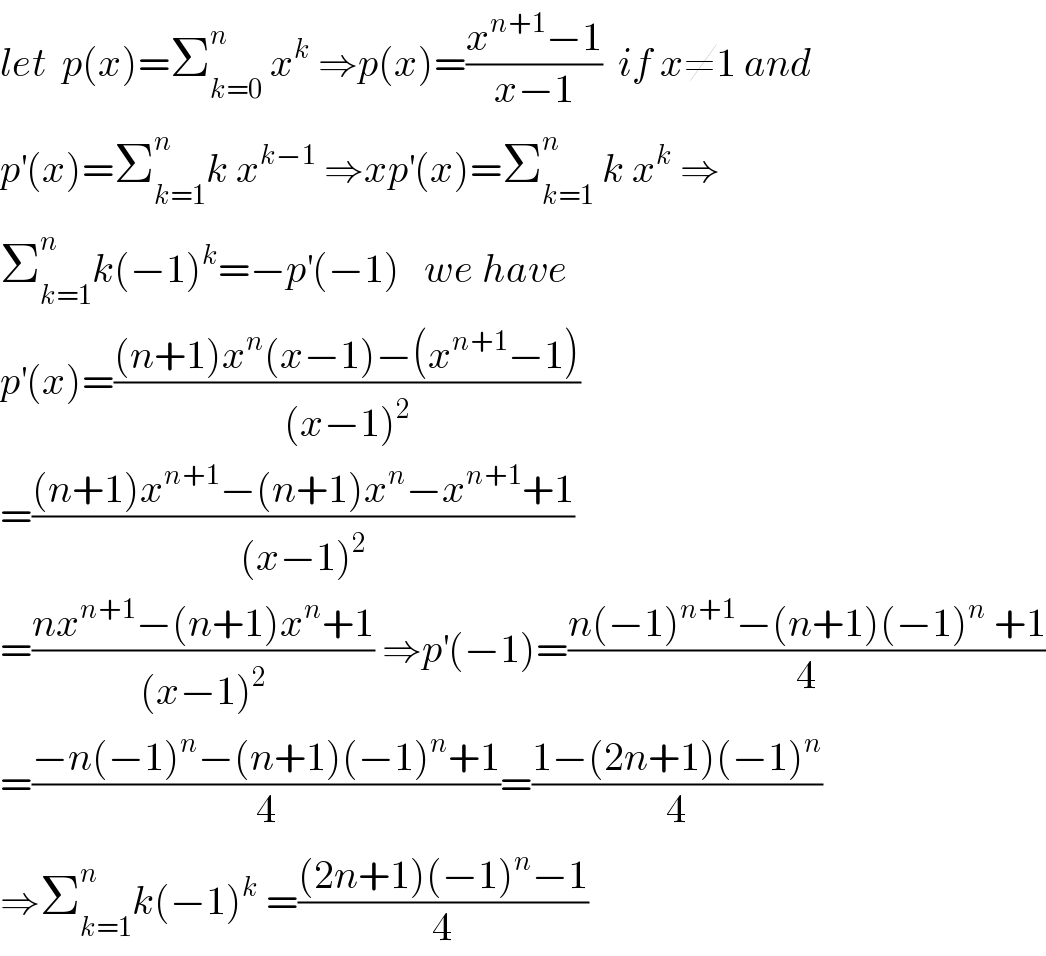
$${let}\:\:{p}\left({x}\right)=\sum_{{k}=\mathrm{0}} ^{{n}} \:{x}^{{k}} \:\Rightarrow{p}\left({x}\right)=\frac{{x}^{{n}+\mathrm{1}} −\mathrm{1}}{{x}−\mathrm{1}}\:\:{if}\:{x}\neq\mathrm{1}\:{and} \\ $$$${p}^{'} \left({x}\right)=\sum_{{k}=\mathrm{1}} ^{{n}} {k}\:{x}^{{k}−\mathrm{1}} \:\Rightarrow{xp}^{'} \left({x}\right)=\sum_{{k}=\mathrm{1}} ^{{n}} \:{k}\:{x}^{{k}} \:\Rightarrow \\ $$$$\sum_{{k}=\mathrm{1}} ^{{n}} {k}\left(−\mathrm{1}\right)^{{k}} =−{p}^{'} \left(−\mathrm{1}\right)\:\:\:{we}\:{have}\: \\ $$$${p}^{'} \left({x}\right)=\frac{\left({n}+\mathrm{1}\right){x}^{{n}} \left({x}−\mathrm{1}\right)−\left({x}^{{n}+\mathrm{1}} −\mathrm{1}\right)}{\left({x}−\mathrm{1}\right)^{\mathrm{2}} } \\ $$$$=\frac{\left({n}+\mathrm{1}\right){x}^{{n}+\mathrm{1}} −\left({n}+\mathrm{1}\right){x}^{{n}} −{x}^{{n}+\mathrm{1}} +\mathrm{1}}{\left({x}−\mathrm{1}\right)^{\mathrm{2}} } \\ $$$$=\frac{{nx}^{{n}+\mathrm{1}} −\left({n}+\mathrm{1}\right){x}^{{n}} +\mathrm{1}}{\left({x}−\mathrm{1}\right)^{\mathrm{2}} }\:\Rightarrow{p}^{'} \left(−\mathrm{1}\right)=\frac{{n}\left(−\mathrm{1}\right)^{{n}+\mathrm{1}} −\left({n}+\mathrm{1}\right)\left(−\mathrm{1}\right)^{{n}} \:+\mathrm{1}}{\mathrm{4}} \\ $$$$=\frac{−{n}\left(−\mathrm{1}\right)^{{n}} −\left({n}+\mathrm{1}\right)\left(−\mathrm{1}\right)^{{n}} +\mathrm{1}}{\mathrm{4}}=\frac{\mathrm{1}−\left(\mathrm{2}{n}+\mathrm{1}\right)\left(−\mathrm{1}\right)^{{n}} }{\mathrm{4}} \\ $$$$\Rightarrow\sum_{{k}=\mathrm{1}} ^{{n}} {k}\left(−\mathrm{1}\right)^{{k}} \:=\frac{\left(\mathrm{2}{n}+\mathrm{1}\right)\left(−\mathrm{1}\right)^{{n}} −\mathrm{1}}{\mathrm{4}} \\ $$
Commented by abdomathmax last updated on 12/Jan/20

$$\Rightarrow\sum_{{k}=\mathrm{1}} ^{{n}} {k}^{\mathrm{2}} \left(−\mathrm{1}\right)^{{k}} \:=\frac{\left({n}^{\mathrm{2}} +{n}\right)\left(−\mathrm{1}\right)^{{n}} }{\mathrm{2}} \\ $$
Commented by john santu last updated on 12/Jan/20

Commented by john santu last updated on 12/Jan/20
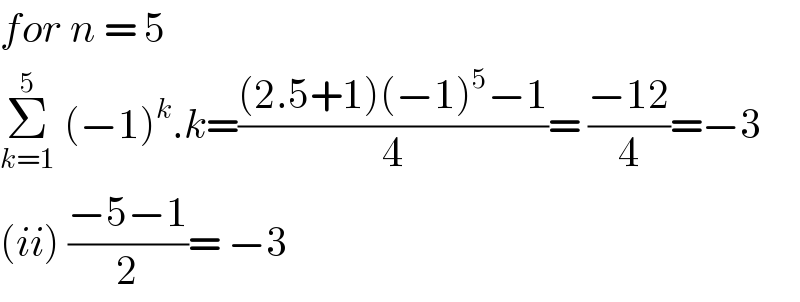
$${for}\:{n}\:=\:\mathrm{5}\: \\ $$$$\underset{{k}=\mathrm{1}} {\overset{\mathrm{5}} {\sum}}\:\left(−\mathrm{1}\right)^{{k}} .{k}=\frac{\left(\mathrm{2}.\mathrm{5}+\mathrm{1}\right)\left(−\mathrm{1}\right)^{\mathrm{5}} −\mathrm{1}}{\mathrm{4}}=\:\frac{−\mathrm{12}}{\mathrm{4}}=−\mathrm{3} \\ $$$$\left({ii}\right)\:\frac{−\mathrm{5}−\mathrm{1}}{\mathrm{2}}=\:−\mathrm{3} \\ $$
Answered by jagoll last updated on 12/Jan/20
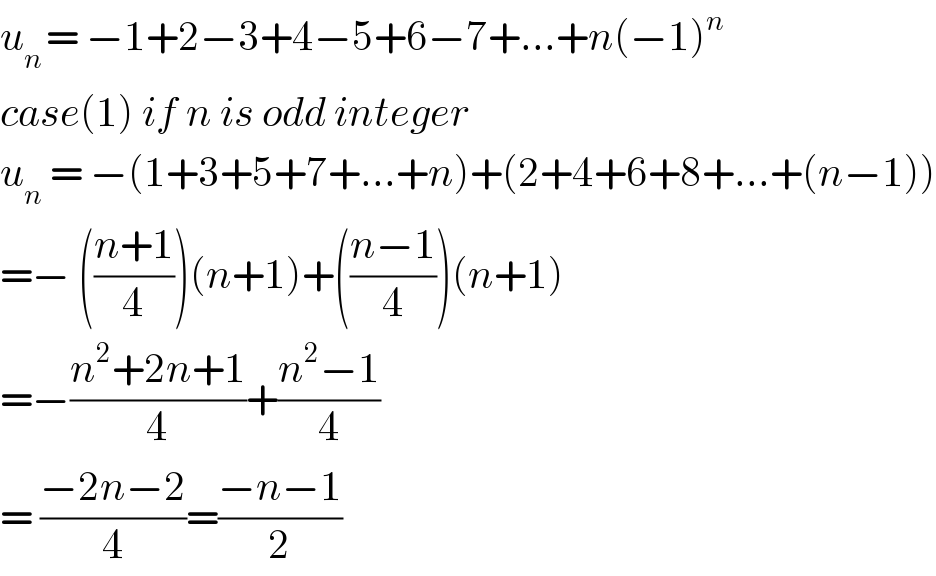
$${u}_{{n}\:} =\:−\mathrm{1}+\mathrm{2}−\mathrm{3}+\mathrm{4}−\mathrm{5}+\mathrm{6}−\mathrm{7}+...+{n}\left(−\mathrm{1}\right)^{{n}} \\ $$$${case}\left(\mathrm{1}\right)\:{if}\:{n}\:{is}\:{odd}\:{integer} \\ $$$${u}_{{n}} \:=\:−\left(\mathrm{1}+\mathrm{3}+\mathrm{5}+\mathrm{7}+...+{n}\right)+\left(\mathrm{2}+\mathrm{4}+\mathrm{6}+\mathrm{8}+...+\left({n}−\mathrm{1}\right)\right) \\ $$$$=−\:\left(\frac{{n}+\mathrm{1}}{\mathrm{4}}\right)\left({n}+\mathrm{1}\right)+\left(\frac{{n}−\mathrm{1}}{\mathrm{4}}\right)\left({n}+\mathrm{1}\right) \\ $$$$=−\frac{{n}^{\mathrm{2}} +\mathrm{2}{n}+\mathrm{1}}{\mathrm{4}}+\frac{{n}^{\mathrm{2}} −\mathrm{1}}{\mathrm{4}} \\ $$$$=\:\frac{−\mathrm{2}{n}−\mathrm{2}}{\mathrm{4}}=\frac{−{n}−\mathrm{1}}{\mathrm{2}} \\ $$
Commented by jagoll last updated on 12/Jan/20
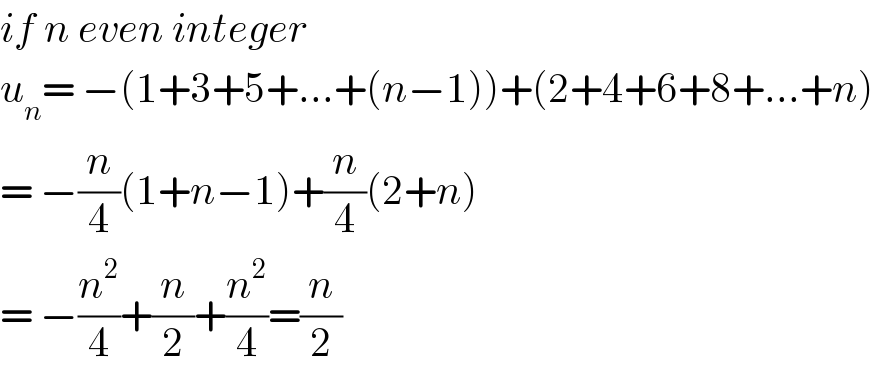
$${if}\:{n}\:{even}\:{integer} \\ $$$${u}_{{n}} =\:−\left(\mathrm{1}+\mathrm{3}+\mathrm{5}+...+\left({n}−\mathrm{1}\right)\right)+\left(\mathrm{2}+\mathrm{4}+\mathrm{6}+\mathrm{8}+...+{n}\right) \\ $$$$=\:−\frac{{n}}{\mathrm{4}}\left(\mathrm{1}+{n}−\mathrm{1}\right)+\frac{{n}}{\mathrm{4}}\left(\mathrm{2}+{n}\right) \\ $$$$=\:−\frac{{n}^{\mathrm{2}} }{\mathrm{4}}+\frac{{n}}{\mathrm{2}}+\frac{{n}^{\mathrm{2}} }{\mathrm{4}}=\frac{{n}}{\mathrm{2}} \\ $$
Commented by mr W last updated on 12/Jan/20
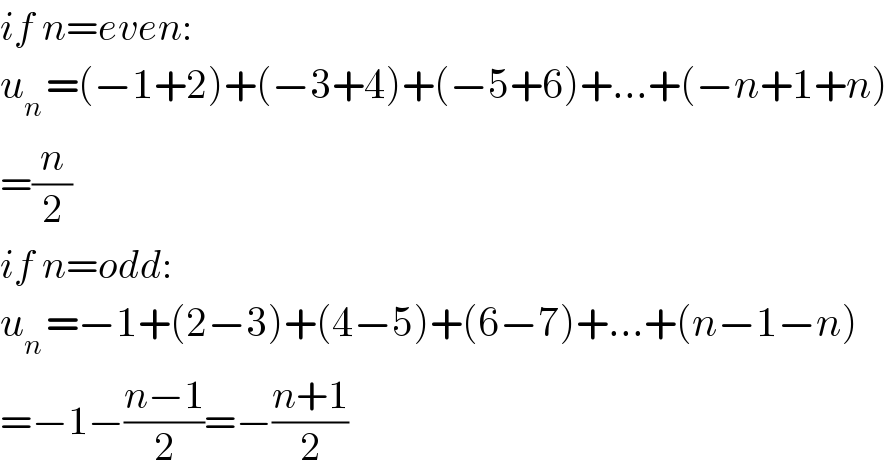
$${if}\:{n}={even}: \\ $$$${u}_{{n}\:} =\left(−\mathrm{1}+\mathrm{2}\right)+\left(−\mathrm{3}+\mathrm{4}\right)+\left(−\mathrm{5}+\mathrm{6}\right)+...+\left(−{n}+\mathrm{1}+{n}\right) \\ $$$$=\frac{{n}}{\mathrm{2}} \\ $$$${if}\:{n}={odd}: \\ $$$${u}_{{n}\:} =−\mathrm{1}+\left(\mathrm{2}−\mathrm{3}\right)+\left(\mathrm{4}−\mathrm{5}\right)+\left(\mathrm{6}−\mathrm{7}\right)+...+\left({n}−\mathrm{1}−{n}\right) \\ $$$$=−\mathrm{1}−\frac{{n}−\mathrm{1}}{\mathrm{2}}=−\frac{{n}+\mathrm{1}}{\mathrm{2}} \\ $$
Commented by jagoll last updated on 12/Jan/20

$${waw}\:{i}'{m}\:{glad}\:{sir}.\:{my}\:{answer}\:{same}\:{with}\:{you}\:{answer} \\ $$
